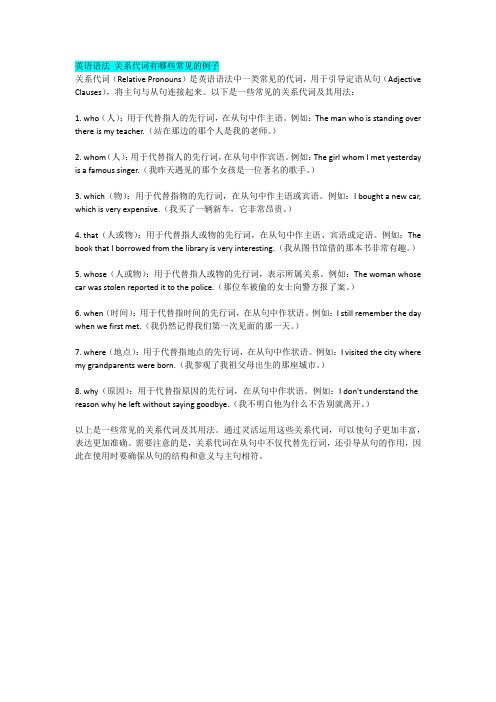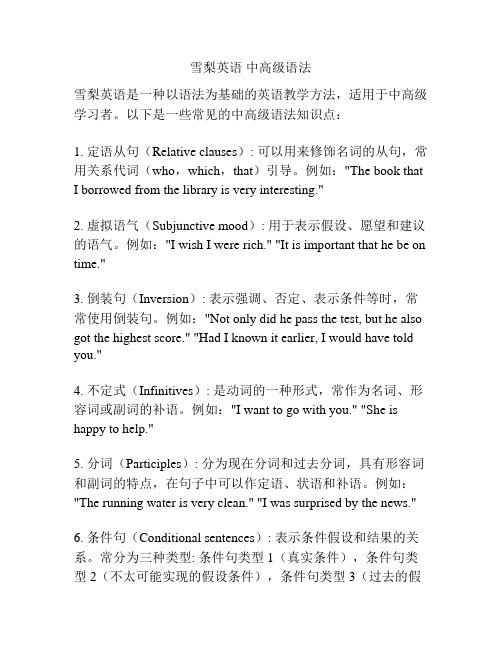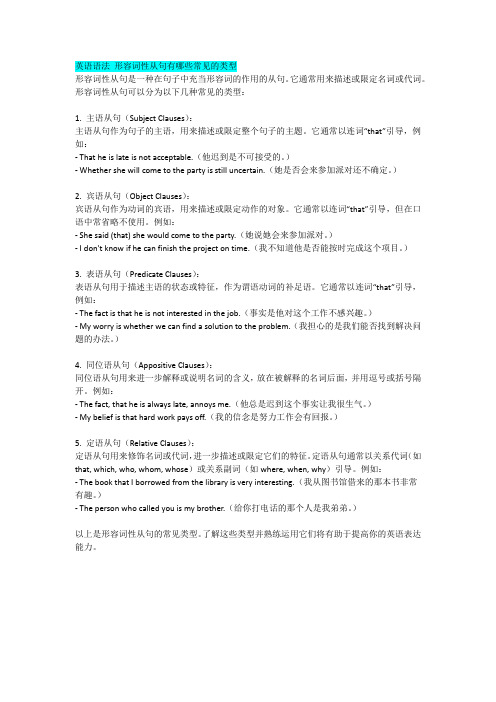英语语法relativeclause
英语语法relativeclause

Relative words
• Relative words include relative pronouns, and relative adverbs. • Relative pronouns: who, whom, whose, that, which, as • Relative adverbs: when, where, why
Lecture 33
Relative Clause (Attributive Clause)
Key Points:
• • • • 1. Types of relative clauses 2. The choice of relative words 3. Ellipsis of relative words (略 p.577-579) 4. The clauses introduced by "preposition + relative pronoun" • 5. The double relative clauses and embedded relative clauses (双重关系分句和 嵌入式关系分句)
Definition of Relative Clauses :
• A relative clause serves as an attribute to a noun or pronoun in the main clause. The noun or pronoun is called the antecedent. The clause is often placed after the antecedent and introduced by relative words.
• 夕阳无限好,只是近黄昏。 • The glow of the setting sun is splendid; it’s a pity that dusk is fast approaching. • 家是你能够得到爱和关怀的地方。 • Home is where you can find love and care. • 今日事,今日毕。 • Never put off till tomorrow what you can do today. • 自助者天助。 • Heaven helps those who help themselves. • 谁笑在最后,谁笑得最好。 • He laughs best who laughs last. • 春天是青年人梦想将来和老年人缅怀过去的季节。 • Spring is a time when youth dreams and old age remembers.
新编英语语法教程Relative_Clause分析解析

Examples
In the years when (that / in which ) food was not enough many people were starved to death. The next day John went with me to the railway station, where I bought a ticket for Beijing. That is the reason why (that / for which ) I am not in favor of the plan.
8. The same… as / such…as/ as…as/ so…as
Relative adverb: as
I lend you such books as will interest you. She knew he felt just the same as she did. Such people as you describe are rare nowadays. Here is so big a stone as no man can lift.
7. Restrictive / nonrestrictive relative clause
restrictive relative clause
The authors who (whom / that ) he mentioned are well-known. He is the man who has strong per adverb
ordinal numeral / last + time + (that)… …time + that / when
英语语法限制性定语从句和非限制性定语从句用法与区别

英语语法限制性定语从句和非限制性定语从句用法与区别在英语语法中,定语从句(Relative Clauses)扮演着非常重要的角色。
其中,限制性定语从句(Restrictive Relative Clauses)和非限制性定语从句(Non-restrictive Relative Clauses)是两种常用的定语从句类型。
它们的用法和结构有所不同,本文将详细介绍限制性定语从句和非限制性定语从句的使用方法及区别。
一、限制性定语从句的用法与结构限制性定语从句用于限制或界定先行词的范围,如果去掉它,主句的意思就不完整或含义发生改变。
常用关系代词有that, who, whom, whose, which, where, when等。
限制性定语从句的结构是:关系代词/关系副词 + 主语 + 谓语。
例句1:The book that you lent me is very interesting.例句2:I know a girl who speaks three languages fluently.二、非限制性定语从句的用法与结构非限制性定语从句是对先行词进行附加说明或解释,不对先行词进行限制或界定。
这种定语从句在句子中起到进一步补充和说明的作用。
非限制性定语从句用逗号隔开,不可以用关系代词that,只能用which, who, whom, whose, where, when等。
非限制性定语从句的结构是:关系代词/关系副词 + 主语 + 谓语 + 逗号.例句1:My brother, who is a doctor, lives in London.例句2:The Eiffel Tower, which is located in Paris, is a famous landmark.三、限制性定语从句与非限制性定语从句的区别1. 逗号的使用:限制性定语从句不使用逗号与主句分开,而非限制性定语从句使用逗号与主句隔开。
英语语法 关系代词在句子中的作用是什么

英语语法关系代词在句子中的作用是什么关系代词(Relative Pronouns)在英语语法中扮演着引导关系从句(Relative Clauses)的角色。
关系从句是一种用来修饰名词或代词的从句,进一步解释或限定其意义。
关系代词不仅引导关系从句,还在从句中充当一个特定的成分,如主语、宾语或介词宾语等。
关系代词可以引导三种类型的关系从句:限制性关系从句、非限制性关系从句和嵌套关系从句。
1. 限制性关系从句:这种关系从句对修饰的名词有限制性的作用。
它提供了对名词的必要信息,去掉它将导致句子意义不完整或不清楚。
常见的关系代词有:- that:用于修饰人或物,作为主语或宾语,用于非人称关系从句。
- who:用于修饰人,作为主语或宾语,用于人称关系从句。
- whom:用于修饰人,作为宾语,用于人称关系从句。
- which:用于修饰物,作为主语或宾语,用于非人称关系从句。
- whose:用于修饰人或物,表示所有关系,用于人称或非人称关系从句。
例如:- The book that I bought is on the table.(我买的那本书在桌子上。
)- The woman who is sitting next to me is my sister.(坐在我旁边的那个女人是我的妹妹。
)- The car which is parked outside is mine.(停在外面的那辆车是我的。
)- This is the house whose owner is a famous actor.(这是那座房子,主人是个著名的演员。
)2. 非限制性关系从句:这种关系从句提供的是对名词的额外信息,但不是必须的,去掉它也不会影响句子的完整性。
常见的关系代词有:- who:用于修饰人,作为主语或宾语,用于人称关系从句。
- which:用于修饰物,作为主语或宾语,用于非人称关系从句。
- whose:用于修饰人或物,表示所有关系,用于人称或非人称关系从句。
英语语法 关系代词有哪些常见的例子

英语语法关系代词有哪些常见的例子关系代词(Relative Pronouns)是英语语法中一类常见的代词,用于引导定语从句(Adjective Clauses),将主句与从句连接起来。
以下是一些常见的关系代词及其用法:1. who(人):用于代替指人的先行词,在从句中作主语。
例如:The man who is standing over there is my teacher.(站在那边的那个人是我的老师。
)2. whom(人):用于代替指人的先行词,在从句中作宾语。
例如:The girl whom I met yesterday is a famous singer.(我昨天遇见的那个女孩是一位著名的歌手。
)3. which(物):用于代替指物的先行词,在从句中作主语或宾语。
例如:I bought a new car, which is very expensive.(我买了一辆新车,它非常昂贵。
)4. that(人或物):用于代替指人或物的先行词,在从句中作主语、宾语或定语。
例如:The book that I borrowed from the library is very interesting.(我从图书馆借的那本书非常有趣。
)5. whose(人或物):用于代替指人或物的先行词,表示所属关系。
例如:The woman whose car was stolen reported it to the police.(那位车被偷的女士向警方报了案。
)6. when(时间):用于代替指时间的先行词,在从句中作状语。
例如:I still remember the day when we first met.(我仍然记得我们第一次见面的那一天。
)7. where(地点):用于代替指地点的先行词,在从句中作状语。
例如:I visited the city where my grandparents were born.(我参观了我祖父母出生的那座城市。
雪梨英语 中高级语法

雪梨英语中高级语法雪梨英语是一种以语法为基础的英语教学方法,适用于中高级学习者。
以下是一些常见的中高级语法知识点:1. 定语从句(Relative clauses): 可以用来修饰名词的从句,常用关系代词(who,which,that)引导。
例如:"The book that I borrowed from the library is very interesting."2. 虚拟语气(Subjunctive mood): 用于表示假设、愿望和建议的语气。
例如:"I wish I were rich." "It is important that he be on time."3. 倒装句(Inversion): 表示强调、否定、表示条件等时,常常使用倒装句。
例如:"Not only did he pass the test, but he also got the highest score." "Had I known it earlier, I would have told you."4. 不定式(Infinitives): 是动词的一种形式,常作为名词、形容词或副词的补语。
例如:"I want to go with you." "She is happy to help."5. 分词(Participles): 分为现在分词和过去分词,具有形容词和副词的特点,在句子中可以作定语、状语和补语。
例如:"The running water is very clean." "I was surprised by the news."6. 条件句(Conditional sentences): 表示条件假设和结果的关系。
2014 Lecture 33 Relative Clause华中农业大学英语语法

▪ He is the man _____ lives next door to us.
▪ He drives a car _____ can travel 150 miles an hour.
Reference:
▪ He is the man who/that lives next door to us.
❖A non-restrictive relative clause does not restrict the referential meaning of the antecedent. If it is taken away, the antecedent still refers to the same person or thing.
_t_h_a_t_i_n_te_rienstteerdeshtiemd. him.
In specific contexts that may cause ambiguity, use who(m) and which.
If the antecedent is a coordinate noun phrase for
袁谦
4
Grammar
Restrictive clauses
❖Restrictive relative clause usually occurs in the following contexts:
❖(1) when the head takes a generic indefinite article
袁谦
9
Grammar
英语语法 形容词性从句有哪些常见的类型

英语语法形容词性从句有哪些常见的类型形容词性从句是一种在句子中充当形容词的作用的从句。
它通常用来描述或限定名词或代词。
形容词性从句可以分为以下几种常见的类型:1. 主语从句(Subject Clauses):主语从句作为句子的主语,用来描述或限定整个句子的主题。
它通常以连词“that”引导,例如:- That he is late is not acceptable.(他迟到是不可接受的。
)- Whether she will come to the party is still uncertain.(她是否会来参加派对还不确定。
)2. 宾语从句(Object Clauses):宾语从句作为动词的宾语,用来描述或限定动作的对象。
它通常以连词“that”引导,但在口语中常省略不使用。
例如:- She said (that) she would come to the party.(她说她会来参加派对。
)- I don't know if he can finish the project on time.(我不知道他是否能按时完成这个项目。
)3. 表语从句(Predicate Clauses):表语从句用于描述主语的状态或特征,作为谓语动词的补足语。
它通常以连词“that”引导,例如:- The fact is that he is not interested in the job.(事实是他对这个工作不感兴趣。
)- My worry is whether we can find a solution to the problem.(我担心的是我们能否找到解决问题的办法。
)4. 同位语从句(Appositive Clauses):同位语从句用来进一步解释或说明名词的含义,放在被解释的名词后面,并用逗号或括号隔开。
例如:- The fact, that he is always late, annoys me.(他总是迟到这个事实让我很生气。
- 1、下载文档前请自行甄别文档内容的完整性,平台不提供额外的编辑、内容补充、找答案等附加服务。
- 2、"仅部分预览"的文档,不可在线预览部分如存在完整性等问题,可反馈申请退款(可完整预览的文档不适用该条件!)。
- 3、如文档侵犯您的权益,请联系客服反馈,我们会尽快为您处理(人工客服工作时间:9:00-18:30)。
• 6. A plane is a machine _t_h_a_t can fly. • 7. Who __th_a_t_ has worked with you as long as I have
does not know the tenderness of your heart?
( 定语 ) 4.I like the book _(_w_h_i_c_h_/t_h_a_t)_ you bought yesterday.
( 宾语 )
Have a try: Fill in proper relative words and
tell their functions.
5. His parents wouldn’t let him marry anyone _w__h_o_se_
8. “That” is often used instead of “which” in speech. e.g. Is this the house (that) you bought?
思考: that 在关系分句和名词性分句中的用法有何区别?
2.Which instead of that
That can’t be used to introduce Nonrestrictive Relative Clauses .
2.先行词被the only,the very,the last, the same 等修饰时,用that。
e.g. He is the only person that I want to see now.
1 .That instead of which
3.先行词前有形容词最高级、序数词修饰时, 用that。 e.g. This is the best book (that) I’ve ever read.
together.
( 状语 )
9. Cars, _w_h_i_c_h_ cause pollution, should be banned.
( 主语)
The choice of relative words
The choice of a relative word depends on: • whether the clause is restrictive or non-
• A restrictive relative clause gives essential information about the meaning of the antecedent. It is not separated from the head by a break in intonation, or by a comma in writing.
1. That instead of which
只用that,不用which的情况:
1. 先行词为不定代词all, little, few, much, no, none, any, anything, everything, nothing。
e.g. Finally, the thief handed everything that he had stolen.
1. That instead of which
6. 疑问代词作先行词时, 需用that。what作先行词时, 也用that。 e.g. Who that has worked with you as long as I have
does not know the tenderness of your heart? 7. 主句以there开头时。 e.g. There is little that I can do to make up for the lost time.
4. 先行词同时指人和指物时,用that。 e.g. We talked about the things and persons that we
saw then.
5.先行词为表语, 或关系代词作从句的表语时, 用that。 e.g. A plane is a machine that can fly. Mr. Smith had unmarked him for the imposter that he was.
• 夕阳无限好,只是近黄昏。
• The glow of the setting sun is splendid; it’s a pity that dusk is fast approaching.
• 家是你能够得到爱和关怀的地方。
• Home is where you can find love and care. • 今日事,今日毕。
2. In the dark street, there wasn’t a single person ______D___ she could turn for help. A. that B. who C. from whom D. to whom
• Spring is a time when youth dreams and old age remembers.
Lecture 33 Relative Clause (Attributive Clause)
Key Points:
• 1. Types of relative clauses • 2. The choice of relative words • 3. Ellipsis of relative words (略 p.577-579) • 4. The clauses introduced by "preposition +
• Never put off till tomorrow what you can do today. • 自助者天助。
• Heaven helps those who help themselves. • 谁笑在最后,谁笑得最好。
• He laughs best who laughs last. • 春天是青年人梦想将来和老年人缅怀过去的季节。
• Relative pronouns: who, whom, whose, that, which, as
• Relative adverbs: when, where, why
Have a try: Fill in proper relative words and
tell their functions.
Types of Relative Clauses:
• Relative clauses are divided into restrictive and nonrestrictive ones.
• Compare: We’re looking for a pub that serves food. Mr. White, whose home is not far from here, is a doctor.
which引导非限定性定语从句,其先行词可是一个词,也 可是整个主句或主句的某一部分。
e.g. 1. She heard a terrible noise, __B____
brought her heart into her mouth. A. it B. which C. this D. that 2. The weather turned out to be good,
Have a try:Put in that or which?
• 1. Finally, the thief handed everything _t_h_a_t he had stolen. • 2. There is little _t_h_a_t I can do to make up for the lost time. • 3. The weather turned out to be good, w__h_ic_hwas more than
• A non-restrictive relative clause adds extra information, separated by commas in writing, and intonation in speaking.
Relative words
• Relative words include relative pronouns, and relative adverbs.
restrictive • whether the head of the noun phrase is
personal or non-personal • what the role of the relative word is within
the relative clause
Common check points:
1.The man w__h_o_/_th_a_t_ came to our school is Mr. Wang. ( 主语 )
2.The girl _(_w_h_o_m__) I met is Lucy. ( 宾语 ) 3.A child __w_h_o_s_e_ parents are dead is called Tom.
relative pronoun" • 5. The double relative clauses and
embedded relative clauses (双重关系分句和 嵌入式关系分句)
Definition of Relative Clauses :
• A relative clause serves as an attribute to a noun or pronoun in the main clause. The noun or pronoun is called the antecedent. The clause is often placed after the antecedent and introduced by relative words.
